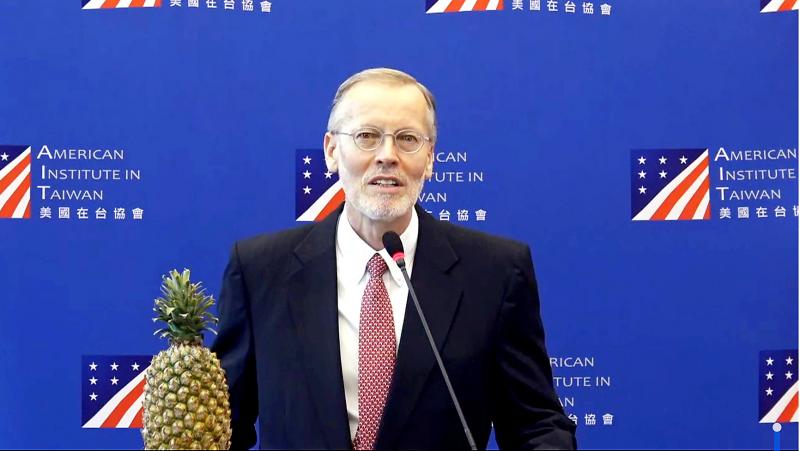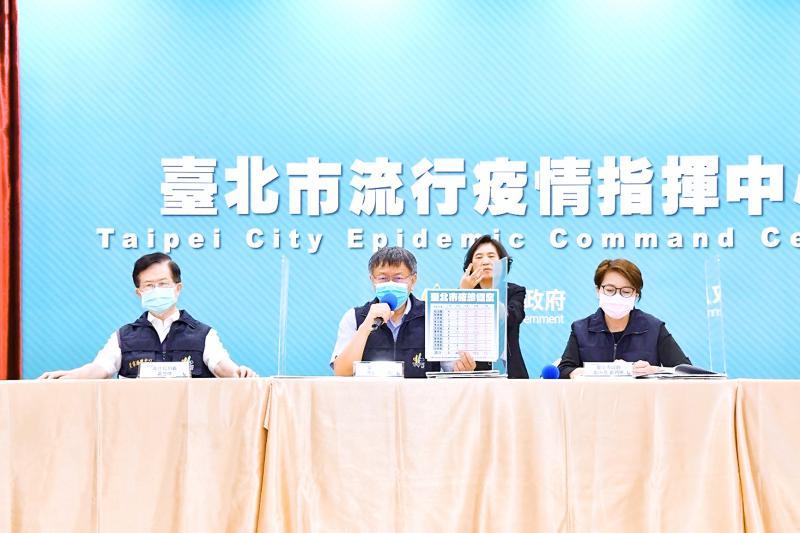The US has not yet determined its criteria for releasing COVID-19 vaccines to other countries, but it would take into consideration infection numbers, healthcare system capacity and vaccination rates, American Institute in Taiwan (AIT) Director Brent Christensen said yesterday.
Christensen made the remarks after giving a virtual farewell speech, as he is to leave his post in July after three years of service.
US President Joe Biden has said that his administration would release millions of AstraZeneca vaccine doses to other countries, but local media have expressed concerns over the US’ standards for selecting recipient nations and whether Taiwan would be among them.

Photo: Lu Yi-hsuan, Taipei Times, from an AIT livestream
Christensen lauded Taiwan’s management of the COVID-19 pandemic and said that the nation’s health authorities would certainly contain the latest outbreak.
“Many of Taiwan’s neighbors in the region are also experiencing outbreaks, while Taiwan’s infection numbers are still among the lowest in the world,” he said.
While the standards for releasing the vaccines are not yet finalized, “the level of infection in the recipient economy, the capacity of the healthcare system and the level of vaccinations” are among the criteria, Christensen said.

Photo courtesy of the Taipei City Government
Taiwan’s locally developed vaccines would also become available in the next few months, he said.
“I can assure everyone that we are engaging with Taiwan at all levels on this issue,” Christensen said.
The Central Epidemic Command Center (CECC) announced that 150,000 AstraZeneca vaccine doses would be distributed to local governments today and frontline healthcare workers who are directly exposed to infected people would have priority.
Areas with high numbers of confirmed cases would receive more vaccines, said Minister of Health and Welfare Chen Shih-chung (陳時中), who heads the center.
The CECC on Wednesday last week announced that 410,040 AstraZeneca doses had arrived via the COVAX global sharing platform, and that they would be administered following tests, which take at least a week.
Demand for COVID-19 vaccines has spiked in Taiwan, as more than 4,000 locally transmitted cases were reported over the past 10 days — a far cry from the situation over the previous few months, when the CECC repeatedly urged people to get jabs.
Chen on Tuesday announced that 2 million vaccine doses would arrive by the end of next month and 10 million doses, including locally produced ones, would be available by August.
Taipei Mayor Ko Wen-je (柯文哲) said that the capital had only two vials of vaccine, or 20 doses, and asked the CECC to consider obtaining more from other countries, as the local COVID-19 situation cannot be continued until August.
Asked about a news report that the center has modified its vaccination guidelines to allow different brands to be used in subsequent doses, Centers for Disease Control (CDC) Deputy Director-General Philip Lo (羅一鈞), deputy head of the CECC’s medical response division, said that such a change is mainly for people who have an allergic reaction after a first shot of the AstraZeneca vaccine.
The general principle is still for people to receive two shots of the same brand, Chen said.
Separately, Nantou County Commissioner Lin Ming-chen (林明溱) on Tuesday said he would use the county’s secondary reserve fund to purchase 300,000 doses of Pfizer-BioNTech’s vaccine from China’s Shanghai Fosun Pharmaceutical Group (上海復星醫藥集團) to administer to county residents, if the CECC approves the deal.
Deputy Minister of the Interior Chen Tsung-yen (陳宗彥), who is deputy head of the center, said that the CECC in a meeting yesterday once again explained the vaccine procurement procedure to local governments.
An authorized distributor must apply for a drug permit and submit documents to the Food and Drug Administration for review before a vaccine can be imported, Chen Tsung-yen said.
Vaccines are an important tool in preventing the spread of COVID-19, so distribution and administration would be coordinated by the CECC, he said.

INVESTIGATION: The case is the latest instance of a DPP figure being implicated in an espionage network accused of allegedly leaking information to Chinese intelligence Democratic Progressive Party (DPP) member Ho Jen-chieh (何仁傑) was detained and held incommunicado yesterday on suspicion of spying for China during his tenure as assistant to then-minister of foreign affairs Joseph Wu (吳釗燮). The Taipei District Prosecutors’ Office said Ho was implicated during its investigation into alleged spying activities by former Presidential Office consultant Wu Shang-yu (吳尚雨). Prosecutors said there is reason to believe Ho breached the National Security Act (國家安全法) by leaking classified Ministry of Foreign Affairs information to Chinese intelligence. Following interrogation, prosecutors petitioned the Taipei District Court to detain Ho, citing concerns over potential collusion or tampering of evidence. The

‘FORM OF PROTEST’: The German Institute Taipei said it was ‘shocked’ to see Nazi symbolism used in connection with political aims as it condemned the incident Sung Chien-liang (宋建樑), who led efforts to recall Democratic Progressive Party (DPP) Legislator Lee Kun-cheng (李坤城), was released on bail of NT$80,000 yesterday amid an outcry over a Nazi armband he wore to questioning the night before. Sung arrived at the New Taipei City District Prosecutors’ Office for questioning in a recall petition forgery case on Tuesday night wearing a red armband bearing a swastika, carrying a copy of Adolf Hitler’s Mein Kampf and giving a Nazi salute. Sung left the building at 1:15am without the armband and apparently covering the book with a coat. This is a serious international scandal and Chinese

Seventy percent of middle and elementary schools now conduct English classes entirely in English, the Ministry of Education said, as it encourages schools nationwide to adopt this practice Minister of Education (MOE) Cheng Ying-yao (鄭英耀) is scheduled to present a report on the government’s bilingual education policy to the Legislative Yuan’s Education and Culture Committee today. The report would outline strategies aimed at expanding access to education, reducing regional disparities and improving talent cultivation. Implementation of bilingual education policies has varied across local governments, occasionally drawing public criticism. For example, some schools have required teachers of non-English subjects to pass English proficiency

TRADE: The premier pledged safeguards on ‘Made in Taiwan’ labeling, anti-dumping measures and stricter export controls to strengthen its position in trade talks Products labeled “made in Taiwan” must be genuinely made in Taiwan, Premier Cho Jung-tai (卓榮泰) said yesterday, vowing to enforce strict safeguards against “origin laundering” and initiate anti-dumping investigations to prevent China dumping its products in Taiwan. Cho made the remarks in a discussion session with representatives from industries in Kaohsiung. In response to the US government’s recent announcement of “reciprocal” tariffs on its trading partners, President William Lai (賴清德) and Cho last week began a series of consultations with industry leaders nationwide to gather feedback and address concerns. Taiwanese and US officials held a videoconference on Friday evening to discuss the